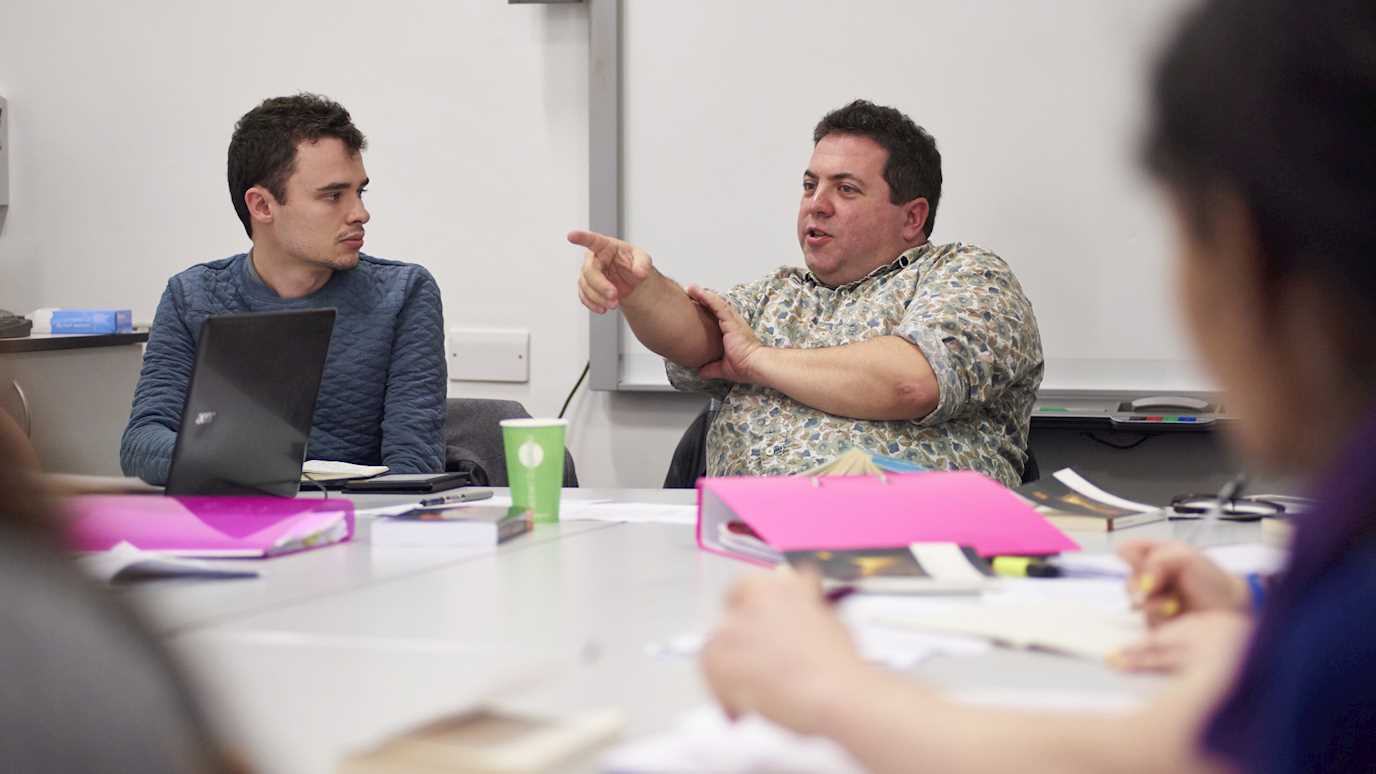Dr Jessica Chiba on Romeo and Juliet.
The English Department at Royal Holloway is home to several renowned Shakespeare scholars including Dr Harry Newman and Dr Deana Rankin. You can study Shakespeare generally as part of the English Literature MA, and with particular focuses on the module ‘King Lear and The Tempest: Critical Debate and Creative Response’.
Key Points
- Romeo and Juliet is a coming-of-age story, about young people discovering the kind of world they inhabit and the constraints it puts on them.
- A comparison with the story Shakespeare adapted reveals a lot about Shakespeare’s focus. The main source is Arthur Brooke’s poem, The Tragical History of Romeus and Juliet (1562)
- All the characters have internalised the feud, and this comes through in the language they use.
- Through sexual attraction and adolescent attraction, Romeo and Juliet expose the twistedness of the society they live in, revealing, through their perfectly natural love, that their inherited hatred is unnatural.
- Through the coming-of-age motif, the play shows the limitations that society places on the young, and the way this moulds their understanding of the world. But it also shows, through love, that these social conditions are contingent, and that there is a potential for a better, less hate-filled world.
Key Quotations
Quotations for focusing on the coming of age theme
In fair Verona, where we lay our scene,
From ancient grudge break to new mutiny,
Where civil blood makes civil hands unclean.
From forth the fatal loins of these two foes
A pair of star-crossed lovers take their life,
Whose misadventured piteous overthrows
Doth with their death bury their parents' strife.
The fearful passage of their death-marked love,
And the continuance of their parents' rage,
Which but their children's end naught could remove (Prologue, 2-11)
Note the contrast set up between the 'ancient' grudge, the 'parents' strife', the 'parents' rage and the 'children's end'.
Samson: I will push Montague's men from the wall and thrust
his maids to the wall.
Gregory: The quarrel is between our masters and us
their men.
Samson: 'Tis all one. I will show myself a tyrant: when
I have fought with the men, I will be civil with the
maids, I will cut off their heads.
Gregory: The heads of the maids?
Samson Ay, the heads of the maids, or their maidenheads,
take it in what sense thou wilt. (1.1.13-25)
The feud and misogynistic thinking are inseparable, but this dialogue also highlights the way the 'quarrel' of the 'masters' are taken on by 'their men'
Capulet: My child is yet a stranger in the world;
She hath not seen the change of fourteen years.
Let two more summers wither in their pride
Ere we may think her ripe to be a bride. (1.2.8-11)
In Brooke's version Juliet is 16. The play makes a point of emphasising Juliet’s youth many times.
Tybalt: This by his voice should be a Montague.
Fetch me my rapier, boy. What, dares the slave
Come hither, covered with an antic face,
To fleer and scorn at our solemnity?
Now by the stock and honour of my kin,
To strike him dead I hold it not a sin.
Capulet: Why, how now, kinsman, wherefore storm you so?
Tybalt: Uncle, this is a Montague, our foe,
A villain that is hither come in spite
To scorn at our solemnity this night.
Capulet: Young Romeo is it?
Tybalt: 'Tis he, that villain Romeo. (1.5.53-63)
Tybalt calls Romeo a villain from the start, and identifies him primarily as a Montague rather than as ‘Romeo’. The name isn’t named until Lord Capulet mentions it. He gives no other reason for offering violence, and, crucially, thinks murder -- on of the seven deadly sins -- is not a sin because of the feud.
Romeo: Is she a Capulet?
O dear account! My life is my foe's debt. (1.5.116-17)
...
Nurse: His name is Romeo, and a Montague,
The only son of your great enemy.
Juliet: My only love sprung from my only hate,
Too early seen unknown, and known too late!
Prodigious birth of love it is to me
That I must love a loathed enemy. (1.5.135-40)
Juliet is certainly too young to have such a hate. See how the nurse also speaks the language of enmity, showing the kind of language and education Juliet is surrounded by to make her think in such terms.
Juliet: O Romeo, Romeo, wherefore art thou Romeo?
Deny thy father and refuse thy name,
Or if thou wilt not, be but sworn my love,
And I'll no longer be a Capulet.
...
'Tis but thy name that is my enemy.
Thou art thyself, though not a Montague.
What's Montague? It is nor hand nor foot,
Nor arm nor face nor any other part
Belonging to a man. O be some other name!
What's in a name? That which we call a rose
By any other word would smell as sweet;
So Romeo would, were he not Romeo called,
Retain that dear perfection which he owes
Without that title. Romeo, doff thy name,
And for thy name, which is no part of thee,
Take all myself. (2.2.33-49)
It hardly needs saying that this is a crucial speech in the play. On one level Juliet is being literal in that she would change her name if Romeo marries her, on another level, this is a questioning of the language and values associated with language that Juliet has been speaking unthinkingly until this point. The strength of the inherited hatred shows itself in her inability to shift the idea that 'Montague' is still her 'enemy'.
Juliet: How cam'st thou hither, tell me, and wherefore?
The orchard walls are high and hard to climb,
And the place death, considering who thou art,
If any of my kinsmen find thee here.
Romeo: With love's light wings did I o'erperch these walls,
For stony limits cannot hold love out,
And what love can do, that dares love attempt;
Therefore thy kinsmen are no stop to me.
Juliet: If they do see thee, they will murder thee. (2.2.62-70)
In spite of Juliet's ability to imagine world in which things are different, she is a realist. She knows that whatever they may wish, if Romeo is seen in the walls of the Capulet household, he will be killed. Their dream in not reflected by reality.
Juliet: My bounty is as boundless as the sea,
My love as deep; the more I give to thee,
The more I have, for both are infinite. (2.2.133-35)
Juliet's conception of her love suggests a capacity beyond ordinary measurement and hence the ability to think beyond ordinary constraints of language and convention, even as she expresses it in the very language she must use to communicate.
Tybalt: Romeo, the love I bear thee can afford
No better term than this: thou art a villain.
Romeo: Tybalt, the reason that I have to love thee
Doth much excuse the appertaining rage
To such a greeting. Villain am I none,
Therefore farewell; I see thou knowest me not.
Tybalt: Boy, this shall not excuse the injuries
That thou hast done me; therefore turn and draw.
Romeo: I do protest I never injuried thee,
But love thee better than thou canst devise
Till thou shalt know the reason of my love.
And so, good Capulet, which name I tender
As dearly as mine own, be satisfied.
Mercutio: O calm, dishonourable, vile submission!
Alla stoccado carries it away. ([Draws.])
Tybalt, you rat-catcher, will you walk?
Tybalt What wouldst thou have with me? (3.1.59-75)
The injuries Romeo has done Tybalt seems to have been the gate-crashing that led to his humiliation by Lord Capulet. Romeo has no recollection of having directly injured or insulted Tybalt. Given that the seed for the quarrel is relatively minor, this can only make sense in terms of a greater sense of honour, a social idea that colours individual actions. Here we can see that Mercutio, who should be an independent party to the feud, is also imbued with the same ideas of honour and violence as Tybalt. The dangers of Verona run deep.
Romeo: Alive, in triumph, and Mercutio slain!
Away to heaven, respective lenity,
And fire-eyed fury be my conduct now.
Now, Tybalt, take the 'villain' back again
That late thou gavest me, for Mercutio's soul
Is but a little way above our heads,
Staying for thine to keep him company.
Either thou or I, or both, must go with him. (3.1.124-31)
Romeo cannot escape the culture he belongs to. The situation is complicated, but the duel between Tybalt and Mercutio forces him back into the codes of honour and revenge that his love for Juliet sought to avoid. His actions are partly determined by the pressures of the world he lives in.
Romeo: Well, Juliet, I will lie with thee tonight.
Let's see for means. O mischief, thou art swift
To enter in the thoughts of desperate men.
I do remember an apothecary,
And hereabouts 'a dwells, which late I noted,
In tattered weeds, with overwhelming brows,
Culling of simples. Meagre were his looks,
Sharp misery had worn him to the bones,
And in his needy shop a tortoise hung,
An alligator stuffed, and other skins
Of ill-shaped fishes; and about his shelves
A beggarly account of empty boxes,
Green earthen pots, bladders and musty seeds,
Remnants of packthread and old cakes of roses
Were thinly scattered to make up a show.
Noting this penury, to myself I said
'An if a man did need a poison now,
Whose sale is present death in Mantua,
Here lives a caitiff wretch would sell it him'.
O, this same thought did but forerun my need,
And this same needy man must sell it me.
As I remember, this should be the house. (5.1.34-55)
This is a characteristically Shakespearean scene, which gives a glimpse of the wider world, reinforcing the key aspects of the rest of the play. There is no reason Shakespeare should include the details of how Romeo acquires the poison. However, Romeo's vivid description and the brief exchange shows that the world is not a happy one, and the choices of the desperate are at least partly determined by need and forces beyond their control, for the apothecary knows it is illegal to sell poison, has moral qualms but must ultimately concede that 'My poverty but not my will consents' (5.1.75)
Prince: Where be these enemies? Capulet, Montague,
See what a scourge is laid upon your hate,
That heaven finds means to kill your joys with love
(5.3.291-3)
One should not attribute the perspective of the play to a particular character, but it is notable that the prince does not blame fate but the hatred and enmity of the houses for the tragedy.
Further Reading
Catherine Belsey, ‘The Name of the Rose in Romeo and Juliet’, The Yearbook of English Studies, 23 (1993), pp. 126-142.
Focuses on the connection between individuals and society, the mind and the body, and how love fits into this model. In her own words, she argues that ‘The bodies of the lovers are inscribed and, crucially, tragically, named. Their own account of love, while it displays a longing to escape the constraints of the symbolic order, reveals in practice precisely the degree to which it is culture that enables love to make sense’ (p. 127).
Kiernan Ryan, 'The Murdering Word', in Shakespeare, 3rd Edition (Basingstoke: Palgrave, 2002), pp. 72-82
Argues against the view that the lover’s end is caused by some sort of tragic fate or death-wish to discuss the language that binds the lovers to the sexual norms of their society and that constrains their potential even as they fight against it.
Susan Snyder, ‘Romeo and Juliet: Comedy into Tragedy’, Essays in Criticism, 20 (1970), pp. 391-402
A classic piece of criticism that looks at the ways in which Romeo and Juliet follows the patterns of a comedy until the unexpected turn – Tybalt’s death – that turns it into a tragedy.
Edward Snow, ‘Language and Sexual Difference in Romeo and Juliet’, in Shakespeare’s “Rough Magic”: Renaissance Essays in Honor of C. L. Barber, ed. by Peter Erikson and Coppélia Kahn (Delaware: University of Delaware Press, 1985), pp. 168-192
Snow examines language in the play as the vehicle through which the love happens, focusing on the way that their lines interact either through the sonnet they speak on their first meeting, or the way the lovers’ language echoes each other. Through this examination Snow rethinks the way language is gendered in the play and the kinds of imaginative worlds that differentiate Romeo and Juliet.
Coppélia Kahn, ‘Coming of Age in Verona’ in Modern Language Studies, 8.1 (1977), pp. 5-22
Argues that the feud is an expression of self-destructive patriarchal society, and discusses the hatred between the houses as an inheritance the members of these families are born with.
Web links
BL Discovering Literature:
























